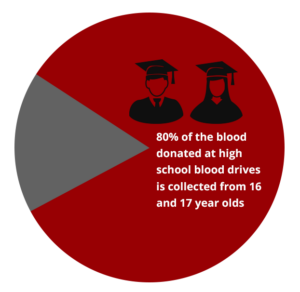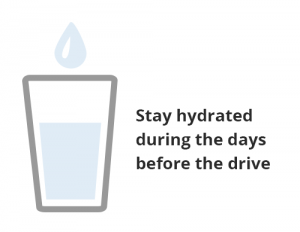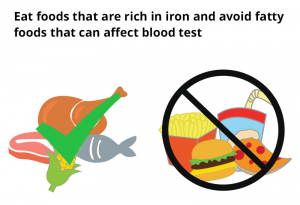Safety Tips if You Are Donating Blood in a Blood Drive

People donate blood for many reasons: to save lives, because a family member or friend may need blood, or just because they think it’s the right thing to do. Blood cannot be manufactured so there is a constant demand for voluntary blood donations. A person involved in a car accident, for example, may require up to a 100 units of blood! To meet the demand, many schools, businesses and civic organizations host blood drives. More than 9 million people donate blood each year, and there is an increasing reliance on recruiting and keeping young donors to maintain a healthy blood supply.
Medical researchers writing in The Journal of the American Medical Association say that the increasing reliance on young blood donors demands a committed approach to donor safety, particularly at high school blood drives.

Eighty percent of blood donated by 16- and 17-year-old students is collected at high school blood drives. The blood donation process is generally a safe process involving a sterile needle, but reactions can occur, and parents of high school students should be aware of them. Oklahoma is among the states that require 16-year-olds to have a signed parental consent form to donate blood.
Before you or your teen donates blood, it’s important to be well informed about blood drive safety precautions. Be aware that young people are at greater risk of complications.
The Oklahoma City Personal Injury Lawyers, Burch, George & Germany, P.C., care about the well-being of our Oklahoma community and have put together the following resources for you and your family.
Complications Experienced by Blood Donation Volunteers
The American Red Cross categorizes complications by symptoms:
- sweating, also known as diaphoresis
- pallid complexion
- lightheadedness or dizziness without loss of consciousness
- loss of consciousness of less than one minute
- extended loss of consciousness complicated by loss of bladder control
- small and large bruises
- rare nerve or artery damage
- allergic reactions
Teenage Donors More Likely to Have Complications
Young donors are much more likely to have donation-related medical complications than older donors, according to an article in The Journal of the American Medical Association. The researchers reported that an analysis of 1.7 million blood donations from nine American Red Cross blood collection centers showed that 16- and 17-year-olds were significantly more likely to experience loss of consciousness and major systemic complications related to fainting than older donors.
• The risk of injury caused by fainting is 2.5 times more likely in 16- and 17-year-olds than for older donors.
• Teens who have low blood volume are at increased risk of complications. An estimate of a potential donor’s blood volume may be made based on their height, weight and gender. But relying on information from donors about their weight and height may result in inaccurate estimates.
• Blood donation removes iron from the body, and may aggravate anemia caused by iron deficiency.
Ten Blood Drive Safety Tips
Volunteering to donate blood is a generous thing to do. Here are some precautions to avoid complications.

1. Be sure to drink a few extra glasses of water in the days before the blood donation. If you drink a glass of water within 10 to 30 minutes of giving blood, it may help avoid dizziness.

2. Be sure to eat foods rich in iron such as spinach, red meat, fish, chicken, beans and cereals fortified with iron in the weeks before you make a blood donation. Try to avoid fatty foods such as hamburgers and French fries that can affect blood tests.
3. Bring a list of medications that you are taking to the blood donation screening. Some drugs have waiting periods before you can donate blood.
4. Provide accurate, up-to-date height and weight information so an accurate calculation of a blood volume can be made. You must weigh at least 110 pounds to be eligible to donate blood. It’s best to take measurements as part of an evaluation before a physical.
5. Bring a driver’s license, donor card or other forms of identification to verify your age.
6. Only donate blood at a high school blood drive where a registered nurse is present.
7. Do not donate blood if you have an acute infection or if you are at risk of being HIV positive. Blood donations are tested for HIV (the virus that causes AIDS), hepatitis B and hepatitis C viruses and other infectious diseases. Tests results are given to the donor and their name placed on a confidential list.
8. Avoid heavy lifting or vigorous exercise for the rest of the day after a blood donation.
9. Student athletes should wait at least 12 hours before resuming exercise. Don’t donate blood on the same day of a strenuous practice or game.
10. Wait at least a year after traveling in a foreign country or countries where malaria is found to donate blood.
Blog CATEGORIES
Let's Talk About It
Speak with an experienced attorney at no cost to you

